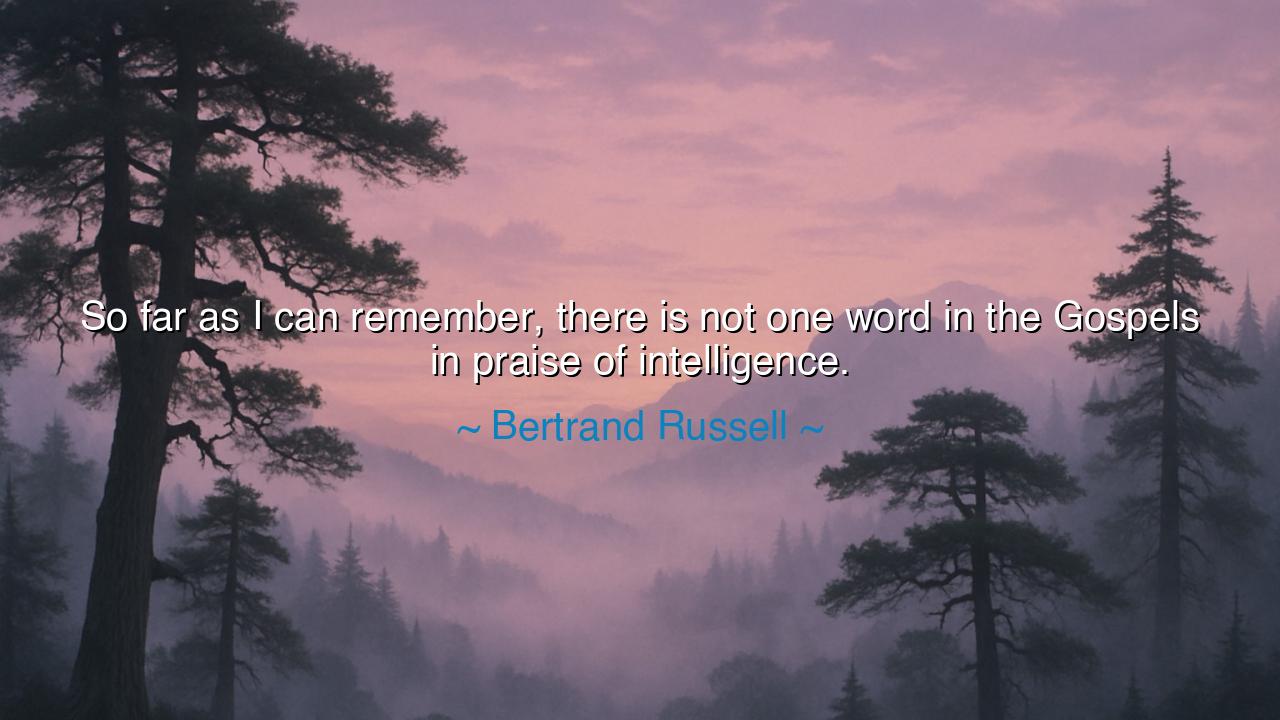
So far as I can remember, there is not one word in the Gospels in
So far as I can remember, there is not one word in the Gospels in praise of intelligence.






“So far as I can remember, there is not one word in the Gospels in praise of intelligence.” Thus spoke Bertrand Russell, the philosopher of reason and rebellion, whose mind dared to challenge every sacred truth of his time. In this statement, Russell does not scorn the teachings of Christ — rather, he exposes the tension between faith and intellect, between wisdom of the spirit and knowledge of the mind. His words are not a rejection of spirituality, but a reflection on how religion, in its ancient form, often prized purity of heart above sharpness of thought. It is a reminder that in the divine texts of old, virtue was measured not by intellect, but by humility, compassion, and faith.
The origin of this quote lies in Russell’s lifelong quest to understand the relationship between human reason and moral truth. A mathematician, logician, and moral philosopher, he was trained to seek clarity and precision — to build understanding upon proof rather than upon faith. When he turned his gaze toward the Gospels, he found that their emphasis was not on intelligence but on the simplicity of the soul. Christ praised the meek, the merciful, and the pure of heart — but not the clever. The intellect, Russell observed, was never celebrated in Scripture, for the wisdom of heaven was portrayed as something distinct from the wisdom of the mind. Thus, his statement stands as both observation and challenge: a call to recognize that the history of faith often values innocence over inquiry, and belief over reason.
Yet Russell’s insight should not be mistaken for cynicism alone. It contains a deeper, more human truth — that intelligence without empathy is cold, but faith without thought is blind. The Gospels spoke to the heart, not the head, because the people of that age needed solace, not science; they needed a message that could reach the poor, the suffering, and the simple in spirit. In praising humility over intellect, Christ sought to break the arrogance of the learned — the Pharisees, the scholars, the powerful — whose knowledge had become a barrier to compassion. Thus, in its own way, the Gospel’s silence on intelligence was a lesson: that wisdom must serve love, and not pride.
History gives us countless examples of this sacred balance between thought and faith. Consider Galileo Galilei, the astronomer who gazed at the heavens and saw truths that defied the Church’s doctrine. His intelligence revealed the vastness of creation — yet for this, he was condemned, forced to silence beneath the weight of fear. But time vindicated him, proving that truth and belief need not be enemies, only that both must be guided by humility. Galileo’s mind sought understanding not to mock the divine, but to honor it more deeply. His life became a living parable of Russell’s warning: that societies which scorn intelligence in the name of holiness risk dimming the light of both.
Russell himself, though often critical of religion, believed in a moral duty of thought — that the human mind was sacred, a divine gift not to be stifled but cultivated. His lament that “not one word in the Gospels” praises intelligence was not a dismissal of faith, but a cry for balance — for a world where the intellect and the soul walk hand in hand. He saw how blind obedience, when divorced from reflection, could lead to cruelty and ignorance, how entire civilizations had been built upon faith yet fallen for lack of reason. To him, intelligence was not arrogance; it was the courage to seek truth, to question, to illuminate.
And yet, even as he championed the mind, Russell’s observation invites a humbling reflection. Perhaps the Gospels did not praise intelligence because true intelligence needs no praise. Like love, it proves itself through its fruit — through understanding, compassion, and the courage to see beyond illusion. The wise man, the enlightened thinker, seeks not applause but truth itself. To him, knowledge is not conquest but communion — a way of drawing nearer to the mystery of existence. In this sense, the silence of Scripture on intelligence may not be ignorance, but reverence — for the divine spark within the human mind needs no validation; it simply is.
Let this, then, be the lesson drawn from Russell’s piercing words: honor both heart and mind, but let neither rule alone. Seek truth with the curiosity of the philosopher and the compassion of the saint. Question boldly, yet love deeply. Read the sacred texts of the world, not as prisons of thought, but as mirrors that reflect your own journey toward understanding. For intelligence without love becomes pride, and love without intelligence becomes folly. The greatest wisdom lies in their union.
And so, let Russell’s insight echo as both warning and invitation: do not wait for praise to pursue understanding. The divine may not always speak in the language of intellect, but the quest for truth is itself a sacred act. To think deeply is to worship in silence; to learn, to grow, to question — these are prayers of the highest order. For in the harmony of thought and spirit lies the true measure of enlightenment, where reason becomes reverence, and intelligence becomes grace.






AAdministratorAdministrator
Welcome, honored guests. Please leave a comment, we will respond soon